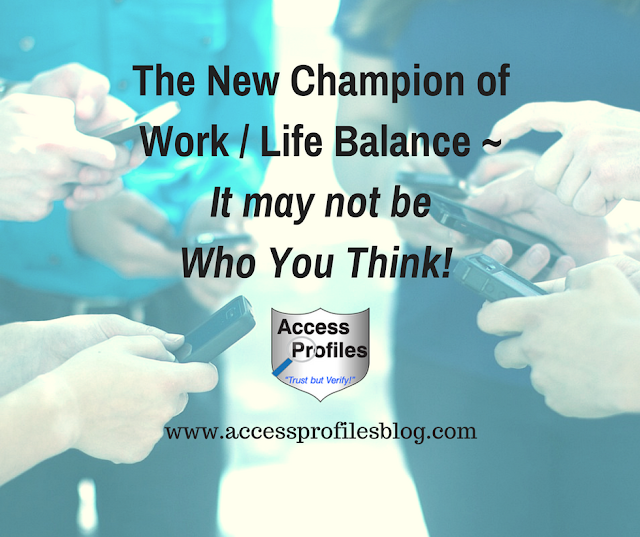 |
| Created by Kimberly Kline, API |
We all talk about Work / Life Balance.
We worry when we spend too much time working and away from our families.
Then we turnaround and worry that we are not spending enough time building our careers.
Either way, it is a stress builder.
And most of that stress comes from feeling like a failure. We are weighed down with guilt over not being able to give the important things in our lives the attention they deserve ~ our partners, our family, our friends, our career, and ourselves.
In reality, I believe that true “balance” is simply not attainable ~ and it is in our best interests to forget about that notion completely. Instead, we must recognize the need to place our focus on the most important task, and less on the other parts of our lives. Then, when that task is under control, we can shift.
The key is to be comfortable and yes, even embrace, that imbalance. That is real life!
You can read more about this in “Why You Need to Forget Work / Life Balance!”.
While that concept is easy to grasp, there are other issues that may seem out of our control.
The issue that tops the list is, as much as we try, most of us are connected to work far more than we would like.
Smart phones, laptops, and a myriad of other technological advances allow us to be constantly accessible. And while that tech was initially intended as a way to make our lives easier, it also keeps us constantly connected and “at work”.
We are able to, and often do, work anywhere at any time. After hours work emails. Texts and messages well beyond scheduled work hours. Phone calls in our car, our homes, and even at our children’s sporting events and on vacation.
That constant connection is not healthy.
In a joint study*(Source1) from Virginia Tech, Lehigh University, and Colorado State, researchers studied the effects of checking “after hours” emails. Of particular interest was the exhaustion level, both emotional and physical, on the subjects due to the “constant connection” with their work.
The results concluded that their employer’s expectations that they stay connected had negative effects. The subjects felt strong pressure to always be “on the job”. This lead to burnout and had a negative impact on their family life.
Many of us are in this same boat.
But that does not mean that we shouldn’t strive to make our lives happier and less stressful. And that often means having a life that is much more well rounded.
 |
| Created by Kimberly Kline, API |
We need time to fulfill our professional goals.
We desire good, quality, family and friend time. We also deserve our own down time.
And there is no doubt that the constant connection by product of new and improved tech devices makes this much harder to achieve.
But we are not alone.
We now have more champions than ever supporting our cause to disconnect ~ but it may not be who you would think!
Governments are getting in on the fight.
Some countries have already passed their own labor laws to curb or ban after hours work emails.
For example, France is promoting their “right to disconnect” law.
Companies are are to set specific hours when employees are not expected to answer or send emails. Germany is contemplating similar legislation. In both countries, the goal is to reduce employee stress by honoring an employees’ free time.
Even in the U.S., the EEOC is weighing in.
More focus is being placed on the importance of Family, Maternity, and Caregiver leave. In addition, minimum wage laws and white collar overtime laws are being passed.
All are designed to address issues that effect the quality our work and family life.
The DOL (Department of Labor) is looking into taking this trend further. As part of their Regulatory Agenda, they are gathering information on employees’ work-related use of electronic devices. The goal is to determine whether the creation of a new rule governing after hours use is necessary.
While the law is trying to catch up,
You can take the reigns and be proactive
in your own Small Business.
And there are definite benefits to doing so!
Helping your employees scale back can make all the difference to them and to your business ~ and that means being less connected.
However, your employees may fear that by not answering emails after work, they are endangering their job or ruining their chances for advancement.
That is why it all has to start at the top. You need to set the example. Showing that you value off time as well as time spent working can make all the difference.
Setting work boundaries also shows you care about your employees well being and recognize that constantly being “at work” is not good for anyone.
High stress levels effect a person’s ability to focus, impacts their general health, and even hurts their family and social life.
None of which is good for your company bottom line.
Instead, doing what you can to alleviate your employees’ stress levels will end up making them more productive, and more valuable to your company.
Find out more in “The Best Way to be Productive? Scale Back!”.
In addition to increasing work productivity, there are many other benefits to enacting practices that help your employees lead a more “balanced” life.
These policies will also help you keep your valued employees, attract more quality new employees, and set your company up as a great place to work.
Helping Your Employees Disconnect from Work Makes Sense! “Tweet This”
What Can You Do to Now Help Your Employees Disconnect:
Not requiring your employees to be “on call” after hours is a start.
Establishing specific hours when they are not expected to send or receive work emails allows them to re-set their focus and enjoy their off time.
If a complete after work email ban is not possible, you could consider implementing a rotating “connected” schedule. Your employees could take turns being the go to point of contact. This would allow for true time off while still keeping your company running smoothly.
But it all needs to begin with the owners and their companies, including Small Businesses.
Starting now to address the issue of after hour work emails makes good business sense. Instead of waiting for the government to get involved and set workplace email rules, you will have established your own polices that work for you, your employees, and your Small Business.
If you can include your employees ideas and needs into those policies, than all the better.
And that is what will make You
a True Champion!
Authored by

I can help you with your Small Business
Hiring and Blogging!

Find out more About Me and My Services too!
Source1: After Hours Email Expectations Hurt Employee Well Being
No comments:
Post a Comment
Thanks for visiting our website. Contact Us! We can answer your questions and offer you a consultation on how we can help You with your Hiring, Business, and Security Needs!
We also invite you to Subscribe. Just leave your email and you will get one new article each month with tips and information focused on You and Your Business!